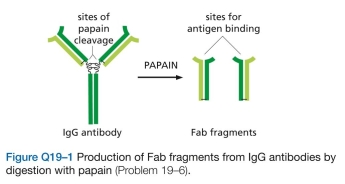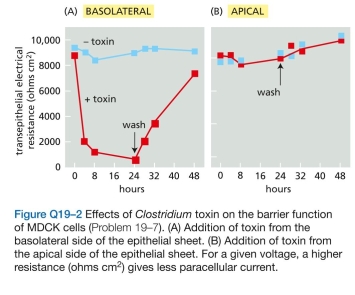
Molecular Biology Of The Cell 6th Edition by Bruce Alberts, Alexander Johnson, Julian Lewis, David Morgan, Martin Raff, Keith Roberts, Peter Walter
Edition 6ISBN: 978-0815345244
Molecular Biology Of The Cell 6th Edition by Bruce Alberts, Alexander Johnson, Julian Lewis, David Morgan, Martin Raff, Keith Roberts, Peter Walter
Edition 6ISBN: 978-0815345244 Exercise 8
Cell adhesion molecules were originally identi- fied using antibodies raised against cell-surface compo- nents to block cell aggregation. In the adhesion-blocking assays, the researchers found it necessary to use antibody fragments, each with a single binding site (so-called Fab fragments), rather than intact IgG antibodies, which are Y-shaped molecules with two identical binding sites. The  Fab fragments were generated by digesting the IgG anti- bodies with papain, a protease, to separate the two bind- ing sites (Figure Q19-1). Why do you suppose it was nec- essary to use Fab fragments to block cell aggregation?
Fab fragments were generated by digesting the IgG anti- bodies with papain, a protease, to separate the two bind- ing sites (Figure Q19-1). Why do you suppose it was nec- essary to use Fab fragments to block cell aggregation?
A. How can it be that two tight-junction strands remain, even though all of the claudin-4 has disappeared? b. Why do you suppose the toxin works when it is added to the basolateral side of the epithelial sheet, but not when added to the apical side?
 Fab fragments were generated by digesting the IgG anti- bodies with papain, a protease, to separate the two bind- ing sites (Figure Q19-1). Why do you suppose it was nec- essary to use Fab fragments to block cell aggregation?
Fab fragments were generated by digesting the IgG anti- bodies with papain, a protease, to separate the two bind- ing sites (Figure Q19-1). Why do you suppose it was nec- essary to use Fab fragments to block cell aggregation? A. How can it be that two tight-junction strands remain, even though all of the claudin-4 has disappeared? b. Why do you suppose the toxin works when it is added to the basolateral side of the epithelial sheet, but not when added to the apical side?

Explanation
All epithelial sheets are anchored to ot...
Molecular Biology Of The Cell 6th Edition by Bruce Alberts, Alexander Johnson, Julian Lewis, David Morgan, Martin Raff, Keith Roberts, Peter Walter
Why don’t you like this exercise?
Other Minimum 8 character and maximum 255 character
Character 255


